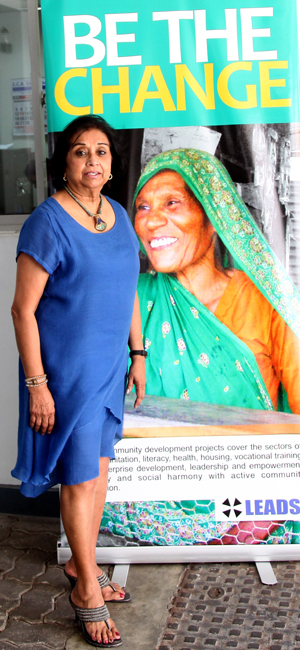Life in the tea plantations that gave impetus to humanitarian work

Saitha Rezel will launch her book Steeping on March 8. Pic by Priyantha Wickramaarachchi
Saitha Rezel’ s birthday parties growing up, are what today’s instagrammers could only dream of. Her 19th birthday in particular stands out: memories of the pool and dancing against the backdrop of the old world charm of the tea estates in Gampola and Kurunegala where she grew up.
On March 8, Saitha will launch ‘Steeping’ her memoir of growing up in the culture of tea plantations and the impact it had on her humanitarian work with the disadvantaged.
Born in Sri Lanka, she like many planters’ children of that time was sent to boarding school at the tender age of four. Her point of view in the book thus transforms from the perspective of a young child “we were watched all the time, so we had to behave properly,” she smiles, to that of a wife, following her marriage to a planter. The first half of her life as seen in the book offers readers a glimpse of a woman’s perspective in the world of plantations. “You had a lot of liberty, but it was also very lonely,” she recalls, her worldview shifting once she took on the role of a wife. Like other planter’s wives before her, Saitha fought off the isolation of the estate with industrious, creative work- which would later help her in her cause as a humanitarian.
Over the last 45 years, Saitha has called Canada her home, pursuing a career as an IT developer. “I had a burning desire to work in India,” she divulges, passionate about serving the spiritual and holistic needs of the disadvantaged. She settled there for five years, working with impoverished communities in micro financing. “Out there, I learnt about myself,” she says, talking of her life in Calcutta where she worked with CrossWorld. She gave back in the way she knew how to- based on her own experiences on her beloved estates.
The pilot project she was involved in began with a foundation in family dynamics, finances and the use of spread sheets before tackling a concept the majority of the community hadn’t heard of before- the importance of saving. At the time of Saitha’s departure, the group of 12 she had been working with had collected almost Rs. 100,000 in savings.
With her experience in India always at the back of her mind, she retuned home where she started work with new immigrants and prisoners. Then in 2016 while in Sri Lanka she happened upon two books- “Plantation Raj” by Herman Gunaratne and Samudra Ratwatte’s “Tea and Memories – Reminiscences of a Planter’s Wife”. Her latent desire to share her own experiences of plantation life came about last January when she was caring for her mother who was in hospital at the time. “I summarized 15 chapters while seated next to her, she laughs modestly.
While the book takes readers to a life in the plantations at its prime it also offers a slice of local culture that would create a sense of nostalgia and longing for a different time.
All proceeds generated by the sale of the book will go towards supporting the work of ESCAPE which is the Child Protection Division of LEADS, a social service organisation. The book launch will be held on March 8 at the Sri Lanka Foundation at 6 p.m. The book will also be available at LEADS Head Office.For further details check out their website at www.leads.lk


